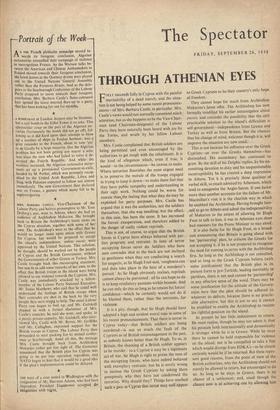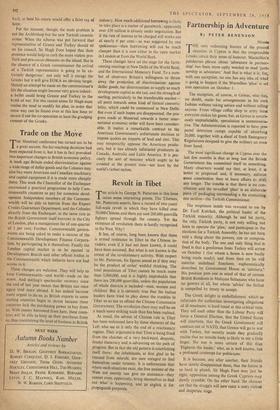THROUGH ATHENIAN EYES UOLLY succeeds folly in Cyprus with the
painful r inevitability of a dead march; and the situa- tion is not being helped by some recent pronounce- ments—of Mrs. Barbara Castle, in particular. Mrs. Castle's views would not normally command much attention, but as she, happens to be the Vice-Chair- man (and Chairman-designate) of the Labour Party they have naturally been heard with joy by the Tories, and wrath by her fellow Labour members.
Mrs. Castle complained that British soldiers are being permitted and even encouraged by the authorities to get tough with the inhabitants. It is the kind of allegation which, even if true, it would—in the circumstances—be unwise to make. Where terrorism flourishes the most urgent need is to preserve the morale of the troops engaged in trying to keep it down—to make them feel that they have public sympathy and understanding in their ugly work. Nothing could be worse for morale thanethe feeling that what they do may be exploited for party purposes. Mrs. Castle has argued that it was the authorities, not the soldiers themselves, that she was needling; but the effect, in this case, has been the same. It has increased the forces' exasperation, and therefore added to the danger of really violent reprisals.
This is not, of course, to argue that the British forces in Cyprus have always behaved with per- fect propriety and restraint. In time of terror occupying forces never do. Soldiers who have seen comrades shot in the back .are not inclined to gentleness when they are conducting a search. for suspects; as Sir Hugh Foot said, 'roughness can and does take place in the heat of a murderer's pursuit.' As Sir Hugh obviously realises, reprisals cannot always be prevented : all he can hope to do is to keep retaliatory passions within bounds. And he can only do this so long as he retains his forces' confidence—which he certainly would.. not do if he blamed them, rather than the terrorists, for violence.
It is a pity, though, that Sir Hugh should have adopted a high and strident moral tone in some of his recent pronouncements. That there is terror in. Cyprus today—that British soldiers are being murdered—is not so much the fault 'of the Cypriots as of British mismanagement in the past, as nobody knows better than Sir Hugh. To us, in Britain, the shooting of a British soldier appears to be murder : to a Cypriot it may be a legitimate act of war. Sir Hugh is right to praise the men of the occupying forces, who have indeed behaved with exemplary restraint; but he is surely wrong to incense the Greek Cypriots by asking them pompously why they have not condemned the terrorists. Why should they? Things have reached such a' pass in Cyprus that terror may well appear to Greek Cypriots to be their country's only hope of freedom.
They cannot hope for much from Archbishop Makarios's latest offer. The Archbishop has now formally modified his earlier intransigence about enosis, and concedes the possibility that the only practicable solution to the island's difficulties is self-governffient—independence from Greece and Turkey as well as from Britain. But the chances that his change of mind, welcome though it is, will improve the situation are now small.
This is not because his influence over the Greek Cypriots—or over the Greeks themselves—has diminished. His ascendancy has continued to grow. By the skill of his Delphic replies, by his un- remitting devotion to duty and his unquestionable incorruptibility he has created a deep impression' in Athens. Yet it is precisely those qualities of verbal skill, so much admired by Athenians, which tend to antagonise the Anglo-Saxon. If one factor more than another accounts for the failure of Mr. Macmillan's visit it is the churlish way in which he snubbed the Archbishop. Having brought him- self to go to Athens and admit the indispensability of Makarios to the extent of allowing Sir Hugh Foot .to talk to him, it was in Athenian eyes sheer bad manners for the Prime Minister to stay aloof.
It is also futile for Sir Hugh Foot, in a broad- cast announcing that Britain is going ahead with her 'partnership' plan, to criticise the Greeks for not accepting it, if he is not prepared to recognise the need for coming to terms with the Archbishop first. So long as the Archbishop is not consulted, and so long as the Greek Cypriots believe (with some justification) that the British plan in its present form is pro-Turkish, leading inevitably to partition, there is not and cannot be 'partnership' in, any effective sense of the word. There may be some justification for the, attitude of the Govern- ment here that the plan should be adhered to, whatever its defects, bCcause there is no practic- able alternative; but this is not to say it cannot be. modified to enable the Archbishop to resume his rightful position on the island.
At present he has little inducement to return. He must realise, though he may not admit it, that his position both internationally and domestically is stronger while he is in Greece. While he stays there he cannot be held responsible for violence on the island; nor is he compelled to take a line which would diverge from EOKA's—as he almost certainly would be if he returned. But these repre- sent good reasons, from the point of view of the British authorities, why the Archbishop should not merely be allowed to return, but encouraged to do so. As long as he stays in Greece, there is no chance 'of a settlement; and, small though the chance now is of achieving one by allowing him back, at least his return would offer a faint ray of hope.
For the moment, though, the main problem Is not the Archbishop but the new Turkish commis- sioner. When the scheme was put forward that representatives of Greece and Turkey should sit on his council, Sir Hugh Foot hoped that their presence would help to curb the more violent pro- Turk and pro-enosis elements on the island. But in the absence of a Greek commissioner the arrival of a Turkish representative is going to be ex- tremely dangerous: not only will it enrage the Greeks but it will give EOKA an obvious target. Should an attempt be made on the commissioner's life the situation might become very grave indeed : a bullet could bring Greece and Turkey to the brink of war. For this reason alone Sir Hugh must realise the need to modify his plan, in order that some way can be found even at this late hour to secure if not the co-operation at least the grudging consent of the Greeks.



































 Previous page
Previous page